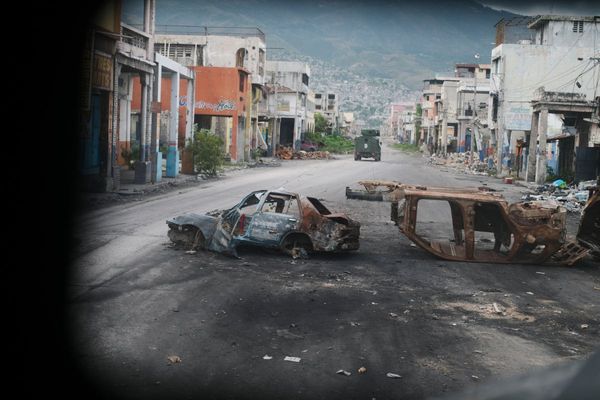
Kenyan author Ngugi wa Thiong'o has died, his daughter announced on Wednesday evening. With his focus on post-colonial identity, he was considered one of East Africa's greatest literary figures.
"It is with a heavy heart that we announce the passing of our dad, Ngugi wa Thiong'o, this Wednesday morning," Wanjiku Wa Ngugi wrote on Facebook. "He lived a full life, fought a good fight."
Messages of support and respect quickly poured in for the celebrated author, whose decision to stop writing in English and start using only his native Kikuyu made him a powerful symbol of post-colonial African identity.
"My condolences to the family and friends of Professor Ngugi wa Thiong'o, a renowned literary giant and scholar, a son of the soil and great patriot whose footprints are indelible," wrote Martha Karua, an opposition leader in Kenya, on social media.
"Always courageous, he made an indelible impact on how we think about our independence, social justice as well as the uses and abuses of political and economic power," she added.
Kenya's president William Ruto paid tribute to Ngugi, writing on his X (formerly Twitter) account that "the towering giant of Kenyan letters has put down his pen for the final time".
'Freedom writer'
"Thank you Mwalimu [teacher] for your freedom writing," wrote Amnesty International's Kenya branch on Wednesday in a statement. "Having already earned his place in Kenyan history, he transitions from mortality to immortality."
A global campaign, in which Amnesty named him a prisoner of conscience, secured his release from Kamiti Maximum Security Prison in December 1978, after he was jailed in 1977 without charge for staging one of his plays – a harsh critique of post-colonial Kenyan society.
Born in 1938 in Kamiriithu, near the capital Nairobi, Ngugi grew up under oppressive British colonial rule, and witnessed the armed Mau Mau struggle for independence.
African book fair in Paris celebrates diversity of diaspora voices
The exploitation, dispossession and repression of independence fighters, which affected the writer's close circle and family, formed the fabric of his writing – as seen in Dreams in a Time of War: A Childhood Memoir, published in 2010.
He had begun his literary career in 1964 with Weep Not, Child, the first major English-language novel by an East African author, followed by A Grain of Wheat and The River Between.
A novelist and post-colonial theorist, his considerable body of work includes novels, short stories, essays and plays, and reflects his political commitment.
Sharp critic
Ngugi took aim in his writings at colonialism but also at the Kenyan elites who inherited many of its privileges. This is why he was arrested in December 1977 and detained for a year, without charge, after peasants and workers performed his play Ngaahika Ndeenda ("I Will Marry When I Want").
Ngugi went into self-imposed exile in 1982 after a ban on theatre groups performing his work in Kenya, moving first to the United Kingdom then to the United States, where he became a professor in New York, then at the University of California-Irvine. He later gained American citizenship.
He continued to write plays and essays, developing a virulent critique of the post-independence bourgeoisie and the oppression of the African working classes. Influenced by Marxist theory and Frantz Fanon, he was also a proponent of Pan-Africanism and African emancipation.
'Beauty exists everywhere’: Ballet builds hope for future in Nairobi slum
In 1986, he published one of his best-known works, Decolonising the Mind, a collection of essays about the role of language in forging national culture, history and identity. The book analyses the violence and "mental enslavement" that the imposition of European languages represented in colonial societies. This led him to abandon English for some time to write in his native language, Kikuyu – a radical but crucial choice.
After more than 20 years of exile, he returned to Kenya in 2004 with his family, after Daniel arap Moi (president from 1978 to 2002) had left power. But he and his wife were soon after the victims of a violent attack in their home, leading them to leave Kenya again. He ended his life living in California.

Family controversy
In 2024, Mũkoma wa Ngũgĩ, one of his six children, accused his father on social media of having physically abused his mother, Ngũgĩ's former wife, the late Nyambura.
“Some of my earliest memories are me going to visit her at my grandmother’s where she would seek refuge," the son, who is also a writer, said. "It is the silencing of who she was that gets me."
Many were shocked by the accusations, particularly given the feminist slant of his famed work The Perfect Nine.
"The reality of the situation is that powerful men are often protected by those around them," columnist Malaika wa Azania wrote in South African newspaper The Herald. "Men and women who know the extent of the damage they are causing on their wives and children but who, in a quest to maintain proximity to power, say and do nothing."
"No man, not even Ngũgĩ wa Thiong’o, is beyond being an abuser," she added.
Kenya’s silent tragedy: a woman killed every two days but justice is nowhere in sight
Literary legacy
In one of his interviews with RFI, Ngugi said: “I am committed in the sense that I campaign for the economic emancipation of the working classes.
"Coming from a peasant background myself, I worked as a young boy in the pyrethrum fields. My brothers and sisters worked on tea plantations belonging to European settlers."
He added it was therefore natural for him to be interested in the economic and social empowerment of the marginalised sections of society. "For me," he said, "it is the only path to a more just world."
(with newswires)







